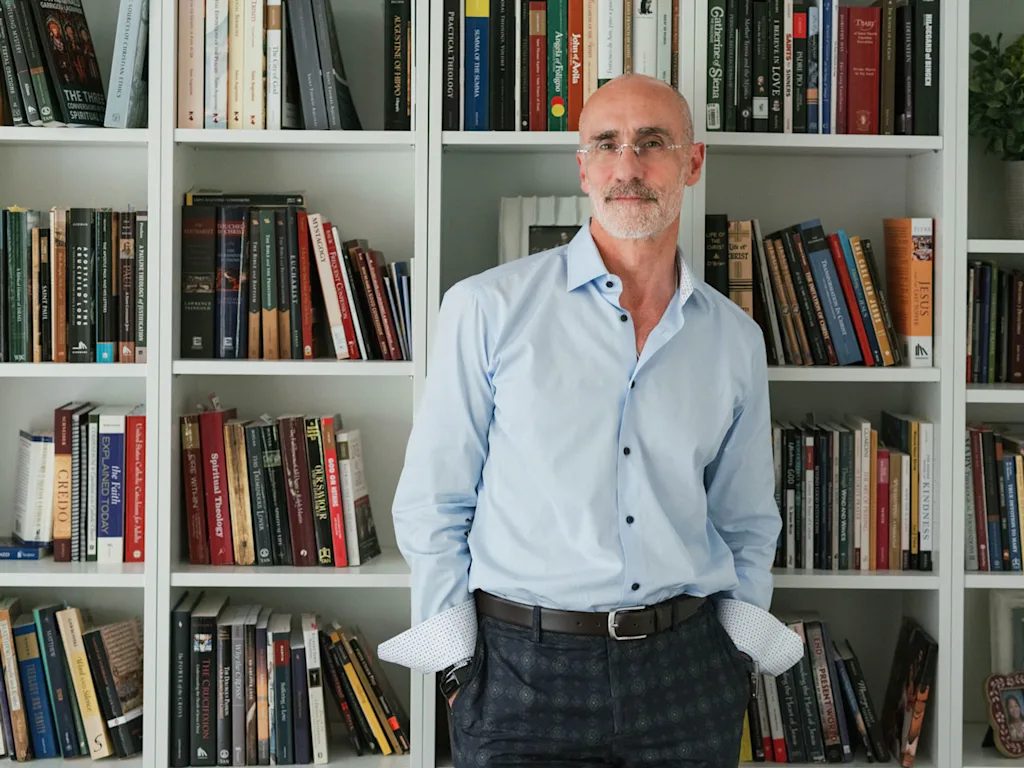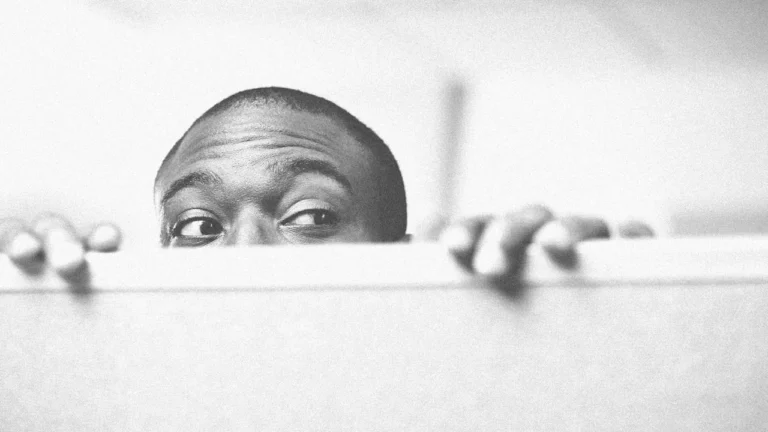
Arthur Brooks is the poster child for an interesting and accomplished life. He has made it a practice to upend his career every decade. He played the French horn for the Barcelona orchestra, is friends with the Dalai Lama, and is the author of 14 books (including one coauthored with Oprah Winfrey).
He’s also a happiness evangelist and a professor at Harvard Kennedy School and Harvard Business School, where he teaches a popular course on leadership and happiness. In addition, he’s a columnist for The Atlantic, where he writes weekly about the tools for building a happier life. Yet even he struggles with his own happiness, which is why he studies it. Now he’s gathered his most popular essays into a new book, The Happiness Files: Insights on Work and Life (Harvard Business Review Press), which goes on sale August 12.

I connected with Brooks on August 4 for an in-depth conversation, in which you’ll learn:
- Why worrying about whether you feel happy is the wrong way to assess whether you are happy
- How you can stop doing the things you hate
- Why ambition often works as a counterpoint to happiness
The following transcript has been edited for length and clarity.
I know you’ve been asked this question a million times, but let’s establish a baseline definition. What is happiness?
I start by defining happiness by what it’s not, which is a feeling. People often say that I can’t define happiness, but I know when I feel it, or it’s how I feel when I’m with the people that I love.
That definition is the reason most people aren’t as happy as they want to be. They have the wrong definition of happiness. Feelings and emotions exist to give us signals about what’s going on around us.
Happiness is something that you actually can study and become more skillful at. It’s similar to nutrition, where you have to get past the smell of the food, which is the feelings of happiness, and getting more toward the macronutrients, which are its component parts.
The macronutrients of happiness are enjoyment, satisfaction, and meaning. To be happy, you need to understand what they are and change your habits to get more of them.
If happiness isn’t a feeling, how do you know you’re on the right track for achieving a happy life?
To begin with, this requires that you pay attention to something other than your feelings. Think about: How much are you enjoying your life? How much do you feel that your life does have meaning? How much satisfaction are you taking in your accomplishments?
Aristotle talked about eudaimonia, which is the good life, well lived, notwithstanding your feelings. It should come to the point where you’re so good at understanding and practicing happiness that you can say, “I had a terrible, terrible day today, and I’m an incredibly happy person.”
In The Happiness Files you write that we should stop doing things we hate. How do you balance that with understanding that some of what you hate doing is an investment into living a happy life?
That’s right. There are things that you do because they are necessary, but you don’t like them. For example, no one wants to wake up at 2 o’clock in the morning to be with their crying child. That’s something that’s not enjoyable, but it is meaningful.
That’s why the three component parts of happiness are so important. If the things that you hate are not enjoyable, they’re not satisfying, and they’re not meaningful, those are the things that you should eliminate if you can.
You can’t eliminate all of them, because life is life. But the best life is one that doesn’t just look for more enjoyment, satisfaction, and meaning. It’s one where you move away from the parts of your life that aren’t any of those things, but you were doing them just because you thought you were supposed to.
In many of your essays, you point out that some of our suffering is because we are trapped in systems that are preying upon our anxiety and fears. What do you tell people who are in these systems but can’t necessarily get out for one reason or another?
It depends on the system that we’re talking about. If we’re talking about a technological system where there’s an overuse of devices and social media, I treat it much the same way that I do with addictive substances and behaviors.
It’s the same set of protocols for detoxing from the dopaminergic pathways where your learning system has been hijacked. You have to put together a series of habits in your life that will replace the things that you’re trying to avoid. There are lots and lots of ways to do this, but you have to recognize that these systems work the same way as any other addictive system.
What if these systems are built into our career progression? For example, you mentioned the news is an entire industry that preys upon people’s anxiety to keep them scrolling. However, for many people, it’s important to stay informed about what’s going on.
To stay informed is very, very different than constantly updating your information. News can be quite addictive, but only when it’s feeding fear, alarm, or anger. Those are amygdala-based responses, and the news media has gotten very good at feeding that and then using technology so you can maximize time in the app.
That’s actually predatory and unethical, but I can’t prohibit it, because I believe in a free society. The truth is nobody should be consuming more than half an hour a day of news.
You’re not going to stop reading news, but you have to set up protocols around it. For example, I read the news once in the morning, and I don’t update. I’m not going to learn anything. I’m just distracting myself, and the best thing to do with these distracting technologies is set up rules.
No more than half of your news reading should be politics. If you read more than 10 or 15 minutes a day of politics, you’re hurting yourself.
Even if you work in politics?
[Laughs] You shouldn’t work in politics. That’s another way to hurt yourself.
But someone has to do it!
I know. I mean it would be great if representing citizens was more of a positive thing to do. Local politics, which isn’t so contentious, is more about that, but there’s this political entertainment establishment that’s really troubling at the national level.
I think we can see this playing out across many different industries besides politics, where the top level is really competitive and can be part of a sick system that exploits you. But what about people who do want to be in the top echelons? Is it possible to be happy at the top?
It’s hard. I wrestled with this my whole career. The truth is that people at the top like CEOs are rarely very happy people. Part of the reason is because their dreams came true, and it turned out they had the wrong dreams.
Look, I’m glad that we have good leaders, and I know some who do really well in spite of it. But nobody does really well in their happiness because of worldly success. They do really well in life along with their worldly success.
The truth is people who have big dreams to help other people, to run organizations, to be a great leader, they need to be very, very careful of other impulses and very careful of other goals. And their goals should not include money, power, pleasure, and fame. If they do, they’re going to wind up incredibly unhappy people.
You’ve had an incredible career. How have you implemented these guardrails in your own life?
Poorly at times, and it’s one of the reasons that I studied this material because happiness has not come naturally to me. It’s not that I’m miserable, it’s that it’s been hard, and I’ve chased the lure of worldly success an awful lot, and I’ve had to understand what really matters to me along the way.
One of the reasons I dedicate my life to the love and happiness of others is because I want to understand these things. I want to teach these things. I want to bring more of these ideas to the world.
The result of it is that now when things go wrong, it doesn’t crush me, and when things go right, it doesn’t throw me so much. Now I’m able to focus more on what I really care about, which is to lift people up and bring them together in bonds of happiness and love, using science and ideas. And I focus on that. And that’s the kind of success that I actually want, transcending myself and bringing a better life to other people.
Then some days, I wake up and I’m like “Darn it. Nobody read my article in The Atlantic today.” And then my wife will say, “Go read your research.”
What has surprised you the most in your research about happiness?
The shocking truth is that we’re not built for happiness. Mother Nature doesn’t care if we’re happy. Mother Nature wants us to survive and pass on our genes and get calories. She also wires us with all of these impulses to make more money and acquire more stuff and use people and worship ourselves. It makes us miserable.
I thought that like food, or craving protein after I work out, if I really have a natural craving for something, it’s probably based on something really healthy. And it’s not necessarily true when it comes to happiness. It turns out Mother Nature lies to me, and I have to be at war with my impulses to become a happier person.
Philosophers have always said that there’s an animal component to the human prefrontal cortex and a transcendent component to our consciousness. The animal component is your physical impulses, and the divine component is your moral aspirations, and going from one to the other, that’s the life in life. That’s the magic of it all
What are the biggest unanswered questions about happiness?
Oh, there are so many. For one, why is it that happiness is so much harder for some people than it is for others? For example, my wife is just naturally so much happier than I am. Why? Is it just brain chemistry? Is there something supernatural about it? Is it a different way of living? I don’t know. I wish I knew. But if I can put the information that people have about their own selves in their hands, then at the very least they can have strategies for becoming happier.


